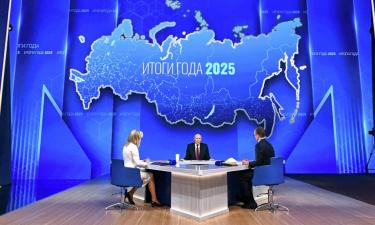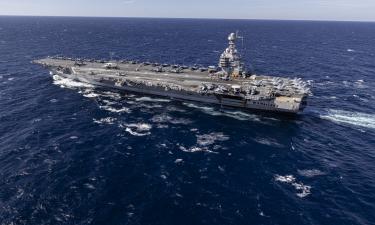ABM Treaty expires. What is Russia’s response?
Today the USA officially withdraws from the ABM Treaty. Washington announced its intention already in December 2001, and the majority of the world's nations reacted negatively to it. Even Washington's allies in Europe demonstrated discontent. However, the resentment did not last for long, as Washington promised to cover European territory with an anti-missile umbrella as well. However, it is still doubtful whether or not it is expedient to create a national missile defense. Indeed, the creation of a national missile defense is really very expensive. Washington is not going to spare money on the project, as many jobs are sure to appear during the creation of the national missile defense. In addition, the project is to become kind of a technological breakthrough similar to that of the 1980s, when the USA actively worked on creation of a strategic defense initiative (or Star Wars program). As is well known, no system was created, but billions of dollars spent on the project were generously repaid. Technologies developed during the creation of a strategic defense initiative are being successfully applied now in the military and civil spheres. It would be quite logical to suppose that new technologies designed to consolidate US’s leading positions will also be created during work on the national missile defense.
On the whole, the project poses a certain threat to Russia’s national security. It is no secret that the USA plans to build launchers for intercepting missiles in Alaska; construction is to start this Saturday. Pentagon spokesmen say that the designed base is to become the center of the new national missile defense system. In addition, a firing pad for intercepting missiles is planned to be built on Kodiak island (Alaska). If we look at the geographic map, we can suggest that this strong shield is designed against Russia, as it is the closest to Alaska. Washington has already mentioned several times that Russia poses no danger to the USA any longer.
RF Duma deputy and member of the Defense Committee Yeugeny Zelenov believes that the US withdrawal from the ABM Treaty is explained by two reasons: political and economic. First comes the political reason: the USA wants universal domination. Despite the fact that much is recently said about the Russia–USA partnership, the policy of the White House makes Russia’s national security dependent on its decisions. Next comes the economic reason: US defense establishments have invested billions of dollars in the development of the national missile defense system. Even if George W.Bush wanted to prolong the 1972 ABM Treaty, he would not be allowed to do so. Especially since the propaganda machine of the White House is operating at its full capacity. You can hardly find a single American who objects to the creation of a national missile defense system. Of course, the following question arises: under these conditions, how should Russia respond?
Moscow has reconciled long ago to the fact that the USA will withdraw from the ABM Treaty. Russia’s Foreign Minister Igor Ivanov said at a G-8 session in Whistler (Canada) that Russia regretted the US’s intention to withdraw from the treaty but, at the same time, expected that the withdrawal was unlikely to entail any surprises. Nevertheless, Moscow will now have to think about Russia's national security under new conditions. In Yeugeny Zelenov’s words, there are several closely interrelated ways to guarantee Russia’s national security. First of all, Moscow is to carry on a more active dialogue with other states concerning security problems. Under the present-day conditions a new arms race may start with the participation of states that have owned nuclear arsenals for a long period of time, i.e, India and Pakistan, which means that it would be quite natural to start a dialogue not only with the West, but also with the East. As the Duma deputy says, it is also necessary to provide sufficient financing to Russian strategic troops. The missiles owned by the Russian army can defeat any anti-missile defense. This is a way to continue the parity between Russia and the USA. It is clear that the above-mentioned above measures are feasible only in the network of a recently concluded strategic offensive potential treaty. As of now, Russia does not have the same financial opportunities the USA does, which is why Russia is unlikely to withdraw from START-1 and START-2. The maintenance of large nuclear arsenals demands considerable financing. On the other hand, this fact is not so bad at all. If Russia strictly observes all the obligations it has assumed, the country will gain more international authority.
In any case, the US withdrawal from the treaty has not yet brought any advantages to Washington. It will take a long time to create the new system, and its results can not be predicted so far. Hitherto, tests of intercepting missiles have not been successful, to put it mildly. And there are no guarantees that future missile tests will be successful.
At the same time, a group of US congressmen announced their support of Democrat Dennis Kucinich, who last week announced his intention to bring an action in court if George W.Bush did not rethink his decision withdraw from the ABM Treaty. The congressmen claims that decisions of this kind can be passed only after Congress’s approval. As the demand remained ignored, Kucinich and other 30 congressmen appealed to the court for the suspension of the US’s withdrawal from the treaty. However, no matter how the case ends, it looks as if Kucinich and his colleagues are simply advertising themselves.
Oleg Artyukov PRAVDA.Ru
Translated by Maria Gousseva
Read the original in Russian: https://www.pravda.ru/main/2002/06/13/42590.html
Subscribe to Pravda.Ru Telegram channel, Facebook, RSS!





